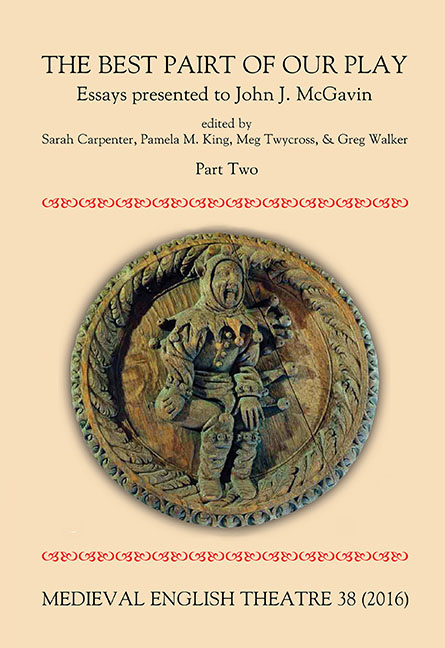 Medieval English Theatre 38
Medieval English Theatre 38 Published online by Cambridge University Press: 20 April 2017
The quotation used as the title of this essay, taken from the prologue to Book 2 of Troilus and Criseyde (completed by early 1387 at the latest), indicates that Chaucer was very aware that language, and its cultural capital, was subject to change over time. This essay examines the cultural appropriation and adaptation of Chaucer's version of Troilus and Criseyde's doomed romance in an anonymous, late sixteenth-century, Welsh-language play, Troelus a Chresyd.
The Welsh play is a synthesis of Books 1–4 of Chaucer's Troilus and Criseyde and the conclusion of The Testament of Cresseid by Scottish poet Robert Henryson (c. 1475). Troelus a Chresyd is an act of translatio, not only from page to stage but also from English into Welsh, the ‘Matter of Troy’ being employed to engage with matters of early modern Wales. Structured in five ‘books’, the action of the play moves as follows:
Book 1: Calchas decides to leave Troy; Priam calls a council to decide whether or not to return Helen; an explanation is given of who Chresyd is before she is called to be judged by Priam as a traitor's daughter (a trial that is not in Chaucer's poem); Hector defends Chresyd; and at this point in the play Troelus falls in love. What follows is a translation of Chaucer's Canticus Troili, further lamentation from Troelus in his love-sick state, and Pandarus’ relief that it is his niece, Chresyd, who is the object of Troelus’ devotion.
Book 2 : Missing its first two lines, Book 2 commences with a translation of the proem of Chaucer's Book 2, Pandarus’ visit to Chresyd's house to persuade her of Troelus’ love and worthiness (a very close translation from Chaucer), closing with Chresyd's concern that she ‘does not know what to believe in this false world’ Ni wyddis i bwy koelir | yn y byd anghowir (stanza 78). The remainder of Book 2 has been left blank.
Book 3 : Again, a section is missing that may well have contained a translation of the prologue of Chaucer's Book 3. Chresyd visits Troelus at Pandarus’ house, and the Chorus narrates their love scene that takes place ‘offstage’ (unlike in Chaucer). The lovers speak an aubade (as in Chaucer's poem), Pandarus advises Troilus to take care to maintain his happiness, and the book concludes with Troilus’ paean to love.
To save this book to your Kindle, first ensure [email protected] is added to your Approved Personal Document E-mail List under your Personal Document Settings on the Manage Your Content and Devices page of your Amazon account. Then enter the ‘name’ part of your Kindle email address below. Find out more about saving to your Kindle.
Note you can select to save to either the @free.kindle.com or @kindle.com variations. ‘@free.kindle.com’ emails are free but can only be saved to your device when it is connected to wi-fi. ‘@kindle.com’ emails can be delivered even when you are not connected to wi-fi, but note that service fees apply.
Find out more about the Kindle Personal Document Service.
To save content items to your account, please confirm that you agree to abide by our usage policies. If this is the first time you use this feature, you will be asked to authorise Cambridge Core to connect with your account. Find out more about saving content to Dropbox.
To save content items to your account, please confirm that you agree to abide by our usage policies. If this is the first time you use this feature, you will be asked to authorise Cambridge Core to connect with your account. Find out more about saving content to Google Drive.